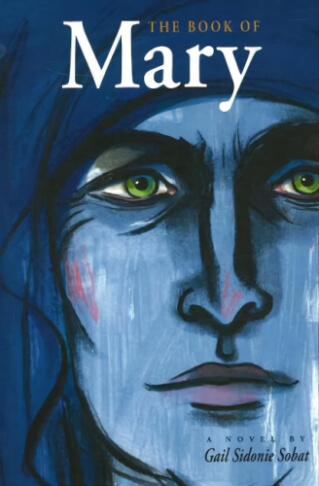|

"The image of Mary depicted by Sobat is not the virginal, devoted, passive creature that has been upheld by Christian society as the universal mother figure in the Madonna-Whore dichotomy. Rather, this Mary is both mother and whore; this Mary is a sexually passionate, doubtful, active feminist who faces issues from STDs to cross-dressing.... [The Book of Mary] contains progressive ideas and basic information about the Gospel without the built-in patriarchal narrative, which has served only to undermine women for far too long." - The Globe and Mail
|
|

"From the first pages of the novel, the reader is introduced to a Mary who defies the traditional Christian portrayal of the Virgin Mary as a symbol of piety. Mary is 14 when she pens her first journal entry onto scrolls received as a birthday gift. She reveals typical modern-day concerns of young women her age despondency, sexuality and body image in a blunt, modern-day vernacular coupled with historical references....Sobat's The Book of Mary is a subversive and irreverent feminist rendition of the life of Mary of Nazareth. While the premise is outrageous and certain to offend some, the book should not be read as a religious attack....Sobat offers us her version as an alternative to the status quo." - FFWD Weekly
|
|

"[The Book of Mary is] a wonderful, controversial, thought-provoking novel that takes Christianity and shakes the hell out of it. Literally….Gail Sidonie Sobat has written a remarkable novel. It is like its human narrator, growing from adolescence to maturity as it progresses. Yes, you already know how some of the book ends. Her son Jesus’ story is well known, the meshegunner rabble rouser. What you do not know are the funny, insightful, dramatic twists she creates to make the reader think about what religion is all about, what responsibility is all about, what--well, pretty much, by the time she is done, what pretty much everything is all about. This is what ‘underground’ literature should be and what mainstream literature all too often avoids. Sobat takes on patriarchy, Christianity, medicine, life responsibilities, family relationships, commercialism, social politics, political politics--you name it---and turns them all on their ears stunningly, leaving the reader with a lifetime's experience to think about. But this is no polemic (although, it gets close at times, and, frankly, guys don't turn out to be that wise). It is very entertaining, funny, dramatic, profoundly involving, and certainly worth the scheckels." - Victor Schwartzman, Underground Literary Alliance Book Review
|
|

"Remarkable, charming, courageous, astonishing. Sobat has created a highly entertaining page-turner, a book I found difficult to put down…. The Book of Mary is the best book I’ve read in the past year…. It’s a thriller; a brilliant, humanist take on Mary; and a damn fine story." - Alberta Views
|
|
|

“What [Sobat] has done here is really mix very good historical record... with sort of a contemporary voice....A very, very enjoyable, wonderful look, an imagined life of Mary. - Laurie Greenwood from CBC's RadioActive Review
|
|

"The Book of Mary reminds us of the vastly different worlds that exist beyond our own. By placing a character who closely resembles your average Western teenage girl, in a culture that may not be familiar to her readers, the author effectively closes the potential distance between subject and audience." - Lucid Forge
|
|

"Sobat's prose is concise and poetic, at times sexy, and always quite human. And it is Mary's humanization that stands as the book's strongest point. Close second is Sobat's capacity to explain away the mystical elements of Christianity and Christ and portray a Mary who is full of aspirations and limited by social codes of acceptability.... [The Book of Mary is] a story of longings for freedom, of ingenuity in the face of adversity, of the strength of community, and of how an individual's contribution can change the world - for better or for worse." - Blackfly Magazine
|
|

"[The Book of Mary] is a story of a girl becoming a woman and coming into her own, refusing to buckle before authority, no matter how harsh and domineering that authority might be. Sobat repeatedly reminds us that in Mary's day, women were stoned on a routine basis. This is, in theory, what kindles Mary's crazy story about a virginal conception. What is so hard to believe, however, is that she actually gets away with it, or with the pseudo hospital and spiritual home for women that she supposedly builds, and which survives, despite the harsh patriarchal rule of law. However, the more I read, the more entranced I became. Sobat is a good story teller, and her Mary becomes a character that it is hard not to fall in love with. And the fact that Sobat comes up with her own version of the story told for 2,000 years becomes rather fascinating. We all know how this one is going to end. But it is the question of what happens to Mary, not to Jesus, that kept this reader turning the page." - The Feminist Review
|
|

"Sobat in … employing the contemporary discourse and juxtaposing the historical tale of Mary of Nazareth with the timeless issues of womanhood, weaves a subversive, provocative and witty tale. Contrary to the Virgin Mary who is robbed of femininity and motherhood, Sobat’s Mary becomes a soul sister for women all around the world." - Female Identity’: Rewritings of Greek and Biblical Myths by Contemporary Women Writers
|
|
